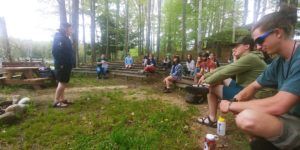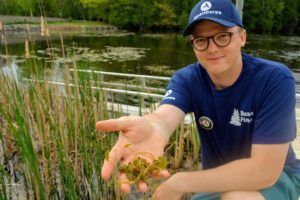A Week To Remember
The week of May 17-23 was a non-stop week for the Huron Pines AmeriCorps(HPA) program. It began with members gathering outdoors at the annual HPA Camp, which took place this year near Tustin, Michigan. For the first time in this AmeriCorps term, I got to be amongst all of the other HPA members, and it was a joyous reunion. Throughout the days at camp, I happily reconnected with second-term members who had to deal with the hardships of COVID-19 during last year’s service term.

Members at HPA Camp got the opportunity to practice public speaking and tell other members about the exciting service projects they are conducting at their host sites.
I also finally got to meet all of the first-term members, who have already done an impressive amount of good for Michigan’s forests, wetlands and wildlife during their first few months of service. Our time at camp provided us a chance to participate in team-building exercises, communicate about ongoing projects at our host sites and discuss opportunities to collaborate and build partnerships with our programs.
After a couple of days of camp, HPA members departed in the early morning hours of Friday, the 21st, to participate in the HPA Signature Service Project at Vanderbilt Area Schools(VAS). The service project was organized by HPA member Samantha Peterson, who is in her third term with the program, along with a top-notch team of Huron Pines staff. The event brought out the entire student body of VAS along with several community members, eager to help with the multiple planned school improvement projects.
Projects included planting trees in the school forest, re-establishing a trail with wood chips, installing new benches in the outdoor classroom area, installing raised garden beds by the school building and a few other landscaping activities and plantings near the school. Although it got up to a warm 85 degrees, it was one of my favorite days of this service term. It was an incredible feeling to be serving side by side with my fellow AmeriCorps members on these projects that will have a measurable impact on the community. To read a more detailed blog post specifically about the service project in Vanderbilt, and see some photos from the day, follow this link .

Second- Term member Nick Theisen helped lead the European Frogbit training in Alpena and will be working on projects to remove and manage the invasive species this summer.
Following the signature service project in Vanderbilt, HPA members had the option to extend their week with an invasive species training opportunity put on by the Huron Pines office in Alpena. Rachel Leggett, who is the Heartland Restoration Team Lead for Huron Pines, and HPA members Nick Theisen and Larissa Schmock organized this opportunity for members to meet at Duck Park in Alpena and paddle around the Thunder Bay River to survey the Alpena Wildlife Sanctuary for the aquatic invasive plant species European Frogbit.
The goal of this elective training was for members to gain experience identifying European Frogbit, use ecological survey apps and help create a map that can be used to determine the range and density of European Frogbit within the Alpena Wildlife Sanctuary. After only a couple of hours on the Thunder Bay River, it was apparent to all of the HPA attendees the devastating and extensive impact of this invasive species, and what a nuisance it is to manage. If you are interested in reading more about European Frogbit, follow this link .
It was indeed a busy week for all of the HPA members. As we head into the summer, and many of the members will be busy with their field seasons, the memories from our marathon week will remain fond in our minds. They will stay to remind us of the impact Huron Pines AmeriCorps members have on the natural resources and communities here in Michigan, and they will help us continue on in our service terms and live out the AmeriCorps pledge to get things done.
The post A Week To Remember appeared first on Michigan United Conservation Clubs.
Recent Posts



